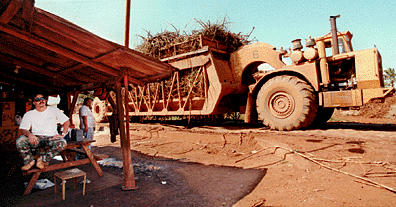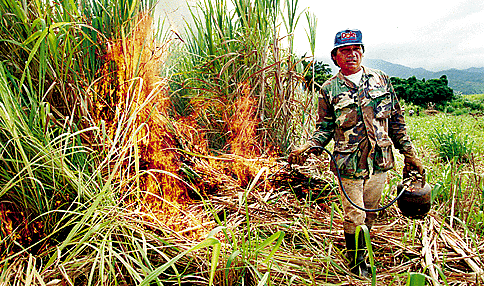
Truck drivers for Waialua Sugar Co. wait for their turn to unload sugar at the company's processing plant on Monday. Today marks the last day of harvesting at Oahu's last sugar plantation.
Photo by George F. Lee, Star-Bulletin

Truck drivers for Waialua Sugar Co. wait for their turn to unload sugar at the company's processing plant on Monday. Today marks the last day of harvesting at Oahu's last sugar plantation.
Photo by George F. Lee, Star-Bulletin
The same day, however, will mark the end of an era for the community with the oft-threatened shutdown of Waialua Sugar Co. finally happening.
The closure also marks the end of sugar on Oahu, following the closure of Amfac/JMB Hawaii's Oahu Sugar Co. in April of last year and Alexander & Baldwin Inc.'s Kahuku Sugar Co. in 1971.
Earlier in the century, there were plantations scattered around the island from Waimanalo to Kualoa, Kahuku, the North Shore and West Oahu. All that has given way to the economic pressure of rising production costs and stagnant prices and land-use pressure from increasing urbanization.
Waialua was able to hang on until now only because of cost cutting and a reasonably inexpensive water supply, said Jerry Vriesenga, president of the parent company Dole Foods-Hawaii.
The remaining workers - 174 of them at the end of last week in a business that once had 2,000 employees - are bringing in the last of the cane from the fields. The harvest was to end today.
Vriesenga said the factory will keep running through Friday until the last of the cane has been crushed and the last of the sugar boiled to make raw sugar for shipment to a California refinery.
Meanwhile, those employees who are not involved in processing at the factory will be doing general cleanup work to prepare for the end, he said.
On Saturday, from noon to 6 p.m., there'll be food and refreshments, music, prizes for the employees and some speeches. It's not a celebration, Vriesenga said, "it's an event."
"We would have had it this Friday, but it's homecoming," he said. The streets and the residents will be busy with a homecoming parade and celebration. By the time the Waialua High football game begins at 7 p.m. Saturday, Waialua Sugar Co. will be finished.
For years, the parent company - Castle & Cooke Inc., later to become Dole Food Co. - said that a shutdown at Waialua was inevitable. In 1987, company Chairman David H. Murdock said Waialua would shut down in 1989. He was persuaded to keep it going but in late 1994 the company announced it had begun a phaseout and would close after the last 1996 harvest.

Vergilio Repollo lights a cane fire to begin the final harvest
at the Waialua Sugar Co.
Photo by George F. Lee, Star-Bulletin
Vriesenga said that losses in sugar required cuts in expenses and that began an inevitable spiral toward closure. "As costs go up, everybody has to cut something," he said.
"Even though the U.S. supports the price (of sugar), the price hasn't increased at all since 1982," he said. Sugar has been in the 20 to 22 cents a pound range all along.
The need to ship all of Hawaii's sugar to California for refining was another added cost, he said.
The company has been working with the community and devising alternative uses for the land, half of which is owned by the company and half by the Bishop Estate.
Diversified farming is one new use. Some 60 acres have been divided into 42 agricultural lots and another 47 acres are available for that use later. An independent Waialua Farmers Cooperative was formed to help the displaced sugar workers get into farming.
Plans have been worked out to put some 1,500 acres into production of hay and wet silage to feed dairy cattle and about half will be planted by year's end. The company has been test planting papaya and coffee.
Vriesenga says the hillsides will look much the same and there will be an environmental plus from the absence of cane burning. There are no plans for real estate development and no plans for the mill.
Passersby will still see smoke from the big smokestack and trucks, smaller than the cane haulers, rolling into the plant.
That's because 40 workers will stay on to operate the boilers, creating heat to run the generating plant that supplies electricity to Hawaiian Electric Co.
They will be burning tree trimmings and other agricultural waste. Some leftover cane will be burned too.